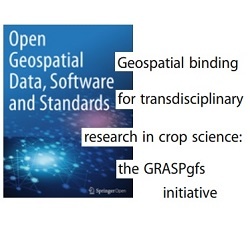Geospatial Data binding for Transdisciplinary Research in Crop Science


"Geospatial binding for transdisciplinary research in crop science: the GRASPgfs initiative", in Open Geospatial Data, Software and Standards 2017 2:20 : https://doi.org/10.1186/s40965-017-0034-3 © The Author(s). 2017
This paper retraces the GRASP-GFS* (Geospatial Resource for Agricultural Species and Pests with integrated workflow modelling to support Global Food Security) endeavor between multiple disciplines around a common objective of facilitating research and model simulations for sustainable food security. |
In particuar, the paper describes the design of the eGRASP platform based on interoperability principles, seamless access as well as sharing for data, metadata and processing models.
The purpose of this platform is to achieve the main focus of the GRASP-GFS - which is to bind geospatial genetic-trait variations and associations with environmental forecasting, in order to generate a transdisciplinary vision of modelling and forecasting for sustainable agriculture.
The approach and the eGRASP platform presented are generic enough to accommodate further complexity into the integrated modelling that this geospatial binding enables.
Keywords: Agriculture models, Crop modelling, Data, Scientific workflow, Geospatial information, Genetic-trait, Interoperability, Geographic Information System (GIS), Open Geosptial Consortium (OGC) standards, Web services.
Enjoy the reading !
*About GRASP-GFS "Access to wide ranging information, from scientific results to local farmer’s knowledge, is crucial to planning food security, from community to national levels… Inter-disciplinary research needed to transform raw data into useful intelligence ... remains constrained by a range of barriers - disciplinary, organizational, historical, and a non-existent or non-rigorous approach to quantifying uncertainty in collected datasets. GRASP-GFS uses a geospatially orientated database to query such multi-dimensional data - including scientific papers, reports, and socio-economic and local knowledge. This framework will enable weighting of the components within a chosen geo-workflow model for food security, which will be developed using cross-disciplinary expertise from geospatial science methodologies", - GRASP-GFS, Nottingham Geospatial Institute. |

